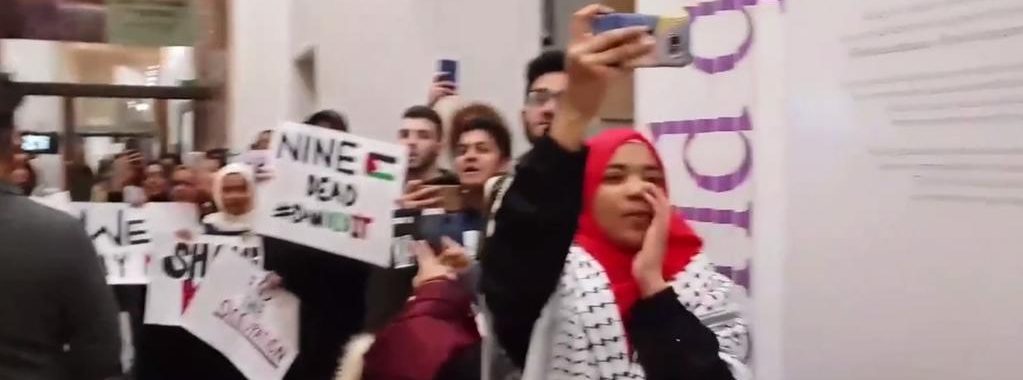On Monday 12 February, former Israeli Deputy Prime Minister and Likud Party politician Dan Meridor gave a speech entitled ‘Threats and Challenges’ to students at the Strand Campus of King’s College London (KCL). Meridor spoke about his long career in Israeli politics, the prospects for peace between Israel and the Palestinians, and also wider geopolitical developments affecting Israel’s relations with her neighbours. He cited ongoing events in Syria as well as recent examples of Iranian and Russian expansionism in the Middle East.
The discussion was chaired by Bar-Ilan Professor and KCL Visiting Professor Menachem Klein, who admitted that his own politics were very different to Meridor’s. This event, which was jointly organised by The Pinsker Centre and the KCL and City University Israel Societies, was met with vocal protests by students and activists affiliated to anti-Israel groups. Dan Meridor, who served in Prime Minister Netanyahu’s cabinet between 2009 and 2013, was alleged by them to have been involved in war crimes and the flouting of international law. He himself called for protestors to attend the talk so that they could relay their concerns and have a “civilised discussion”.
KCL staff and private security personnel ensured that no violent altercations took place. However, students attending the talk witnessed a barrage of divisive rhetoric such as “From the River to the Sea, Palestine will be Free”, “Free Palestine”, “Israel is a Terrorist State”, “War Criminal” and “Shame”.
Representatives of non-student groups like the Palestine Solidarity Campaign (PSC) and the extremist organisation Friends of Al-Aqsa also promoted the protest, with the latter live streaming it to their online followers. Using dehumanising language with anti-Semitic connotations, one online follower labelled attendees “cockroaches”.
Video footage shows how a crowd of around sixty protestors waved placards and sought to disrupt the event by screaming loudly outside the entrance to the lecture room where Meridor was speaking. Some protestors were reported to have photographed members of the audience leaving the room.
Tamara Berens, the President of the KCL Israel Society, reported to The Jewish Chronicle that attendees had “fingers pointed in our faces”. Most worryingly of all, she commented: “It is disgraceful that in 2018, Jewish university students should be made to feel afraid or ashamed to walk freely on campus”.
The Union of Jewish Students (UJS) condemned what it called “disgraceful scenes”, and the President of the Board of Deputies of British Jews claimed that he would be in contact with the Principal of KCL to “gain assurances that there will be no repeat”. Both the Board and the event organisers accused KCL’s security team of not doing enough to prevent protestors from entering the building.
A KCL representative defended its procedures for the event, stating that: “If our review process highlights any potential risks, we put additional conditions in place before permitting the event to proceed”.
KCL has a special responsibility to defend the freedom of speech of Israeli speakers – after all, it was a violent episode involving the visit of former Shin Bet head Ami Ayalon in 2016 that directly led to the formation of the Pinsker Centre, one of the hosts of Monday night’s event.
Sam Gyimah, the newly appointed Universities Minister, recently warned parliament that there is a “creeping culture of censorship” on university campuses, which includes attempts to silence speakers on the subject of Israel. A widespread assault on freedom of expression has targeted speakers on many different topics, such as forceful attempts to silence Conservative MP Jacob Rees-Mogg when he spoke at the University of West England (UWE) earlier this month.
Rightfully, the Pinsker Centre has said that it does not oppose students’ “democratic right” to peacefully protest, a right also upheld by the UJS and the Board of Deputies. However, the Pinsker Centre has pointed out that “the sacred right to freedom of speech is also extended to visiting Israeli lecturers, including Mr Meridor”.
Student Rights believes this principle of consistency should be applied to all speakers, no matter how controversial their background. We hope that KCL can fully ensure that future speakers, Israeli or otherwise, are not subject to similar attempts at disruption in future, nor their audience subject to unacceptable levels of hostility and intimidation.
